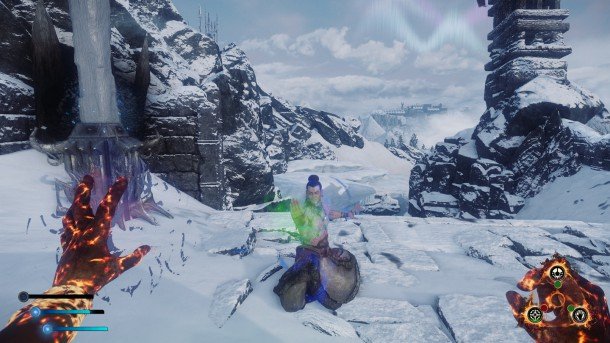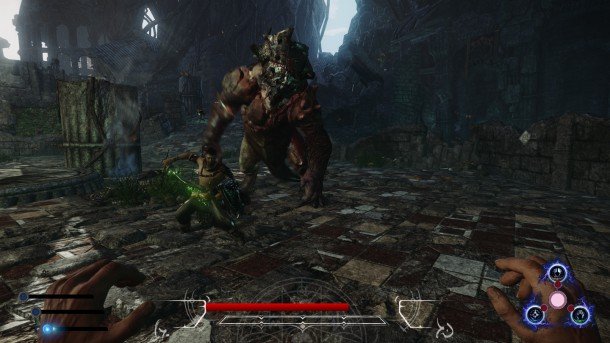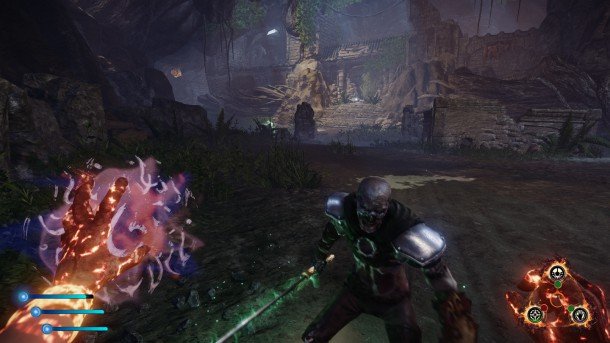Lichdom: Battlemage review (Early Access)

Early Access reviews offer our preliminary verdicts on in-development games. We may follow up this unscored review with a final, scored review in the future.
Version reviewed: Patches 2014.06.17.57581 and 2014.06.24.58446
Reviewed on: i5-2500k 3.6 GHz, 8 GB RAM, GTX 560 Ti 2 GB
Recommended: Quad-core 3.5 GHz, 8 GB RAM, 1024 MB graphics card
Price: Discounted at $24/£17.99 through July 21
Publisher/Developer: Xaviant Games
Multiplayer: Nope
Link: Steam store
Lichdom: Battlemage starts with a death—my own. But it's just the first of many. I can't avoid death, just accept it. It's the hammer and chisel I use to carve out my own vision of what a battlemage can be.
In Lichdom, I'm the hand-picked magical avatar of a mysterious sorcerer named Roth in his war against the Cult of Malthus. All I need to cheat death are magic bracers that resurrect me and plug me into the same arcane energy source from which Roth draws his power. The Malthus cult, an eponymous group dedicated to a legendary dark mage, is corrupting my city, but all I want is revenge for the death of my wife after a run-in with a violently unfriendly cultist named Count Shax.
Roth is Fistandantilus to my Raistlin. I'm a pawn in his multi-dimensional fight against the cult and it isn't clear if that's all he has planned for me. For Roth, what's important is my natural affinity for magic and my emotionally-unstable thirst for vengeance. I can choose between a male or female protagonist when starting a new game. This choice changes my specific motivation for revenge, but the connection to Roth is similar—he needs me.
Available now as an alpha through Steam Early Access, Lichdom's story is currently incomplete. With three levels waiting for players in the alpha build, what players can experiment with right now is the first-person action RPG's deep, and at times, frustratingly complex magic system. Roth's dragons command a variety of sigils, or magic schools. In the alpha these range from the expected fire, ice, and lightning spells to the more exotic arts of parasitic corruption, powerful kinesis, and disruptive delirium. Two more are set to be added to this list, according to developer Xaviant Games
Power in my hands
Within each sigil players can craft spells from components collected on the battlefield that focus their arcane arts in one of three areas—a targeted range attack, a defensive magical shield, and an area-of-effect spell you can drop on multiple targets. Inside each of these subgroups there's an additional layer of specialization—destruction, control, and mastery. Destruction emphasizes pure damage output, while control will afflict enemies with different obstacles that slow them down or paralyze them for brief periods. Think zombies frozen solid or martial artists encased in a blistering energy field.

Mastery is a more mysterious phenomenon to understand. Its effects stack on top of other spells you cast and only reveals its true offensive potential when used correctly and in the right moments. Basic spells are easy to grasp. But crafting effective upgrades in order to progress through the story can turn into a mundane process of loot farming and trial-and-error experimentation. Sometimes this yields new and intriguing spell effects, but it also clutters up my inventory with similar-looking items. This lack of clarity and explanation for the crafting system is the game's biggest weakness at the moment. The most-powerful spells feel just out of reach. It fits my character's fish-out-of-water origin story, but I also get frustrated and ask myself why the hell Roth isn't helping me more.
The biggest gaming news, reviews and hardware deals
Keep up to date with the most important stories and the best deals, as picked by the PC Gamer team.
A magical toolbox
My initial experiences in Lichdom remind me of Bioshock: Infinite. Combat is twitchy and never static. I have to move to survive, because most of Lichdom's varied battle arenas give me a mix of melee and ranged combat. Cool-down wait times and mana bars are absent—each spell is there for me to use as I need it. Some spells can be cast more quickly than others and work better in different situations, but the goal in Lichdom is ultimately revenge by overwhelming your enemies with magical destruction.
But destruction is just one piece of Lichdom's arcane puzzle. I died a lot to learn this lesson. The second major boss, a special gift from Count Shax, was a surprise so difficult that it made me question all the strategies and crafting I had used to reach that point. My favorite attacks until then had been a potent combo of control magic followed up by destruction. Most of the time this meant immobilization through a kinetic control spell before finishing enemies off with a dose of chain lightning for a critical damage bonus. I would send the standard zombies and punch-throwing cultists into the sky before I blasted them with energy. But I could also freeze them in place with ice before covering them with infectious, parasitically-explosive blobs of goo.

With good cover and effective use of the game's dodge spell, this let me barrel through most of the available game. At least until that boss. All the strategies that had seemed so effective failed me again and again and again. I was forced to re-group at a point in the story that felt out of balance with the rest of my experience in the game.Victory came eventually, but not without some severe gnashing of the teeth and grinding for better spell-crafting material.
I realized in that battle that Lichdom likes to give players several dimensions of danger to consider at the same time. Yes, it's about being a powerful magic user—a battlemage—but it's also about being able to use your mind to solve problems that aren't immediately obvious. Have I crafted and synthesized enough of the right spell materials to match these opponents? Is this challenge really more about defense than offense?
The way of the wizard
Lichdom has a standard suite of game settings, including a handy FOV slider, but the difficulty level is fixed in the alpha build. When confronted with an especially troublesome gang of undead monsters or level boss, it's a lot of trial and error before you find a system of attack and defend that works in each situation. Resurrections happen from specific save points along Lichdom's mostly-linear traversal through some very gorgeous environments represented in the alpha's three levels. The game succeeds in making every encounter feel dangerous, but it's not always clear how to learn from my mistakes.

Although Xaviant plans to add more enemy types and several additional levels, the alpha's already-mature magic system is Lichdom's real draw at the moment. The developer's claim to offer up to 12 hours of game time in the alpha feels about right, depending on how long it takes to learn the basics of spellcrafting. The version I played was stable, but had at least one spell upgrade bug and an issue that saw NPCs sometimes disappear when replaying a level.
Lichdom is an unfinished, but pretty-looking and complex action RPG. The story's focus on revenge pushes me to seek out power and devise new ways to burn, smash, and corrupt my enemies. It's a classic wizarding tale, but one that fits Lichdom's look and feel almost perfectly. With a lot more guidance from the game for a player's initial playthrough, I'm hopeful the full release will live up to its obvious ambition.
Verdict
A punchy and difficult first-person action RPG with a story I want to see to the end. I'd wait for the full release so that all the time invested in mastering the game's deep magic system can be used to experience the complete adventure.
Outlook
Good. Lichdom is set to enter beta in late July before its August 26 launch. The full game should see multiple new levels, more varied enemies, and additional tutorials. With more explanation in-game about the workings of its crafting mechanic, the result could be spectacular.

